牛津深圳版七下:Unit8 Grammar 课件( 23张PPT)
文档属性
| 名称 | 牛津深圳版七下:Unit8 Grammar 课件( 23张PPT) | 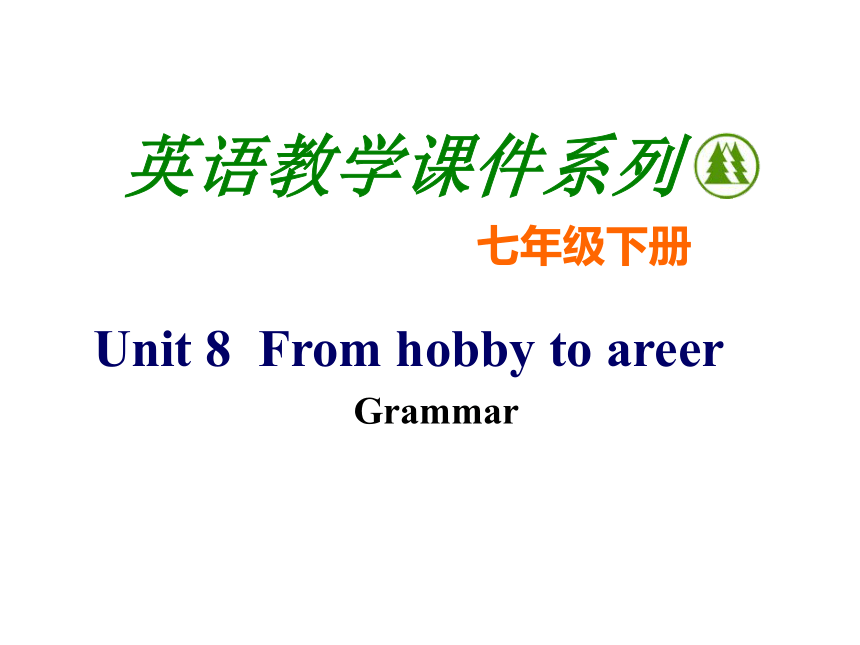 | |
| 格式 | ppt | ||
| 文件大小 | 1.3MB | ||
| 资源类型 | 教案 | ||
| 版本资源 | 牛津深圳版 | ||
| 科目 | 英语 | ||
| 更新时间 | 2021-04-16 18:14:43 | ||
图片预览


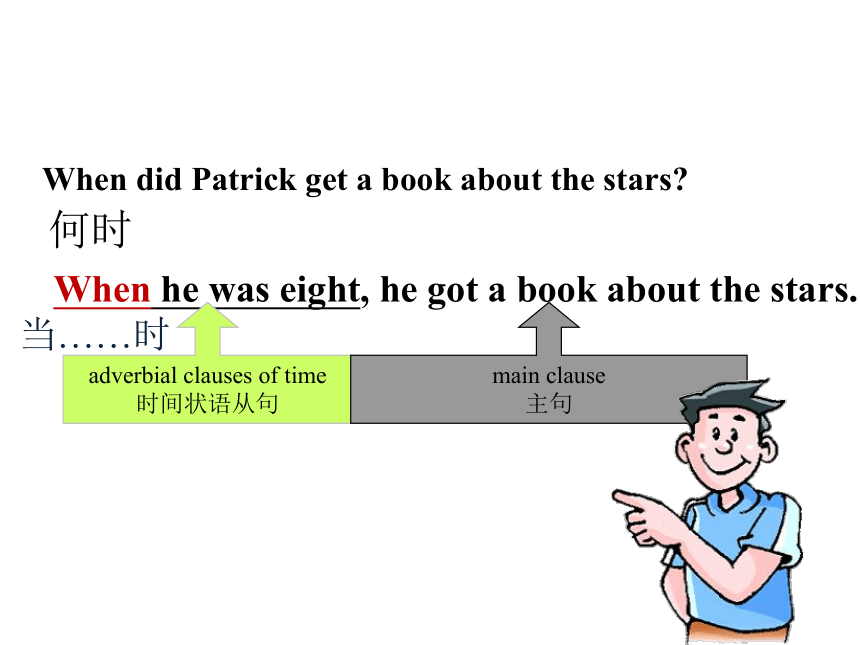
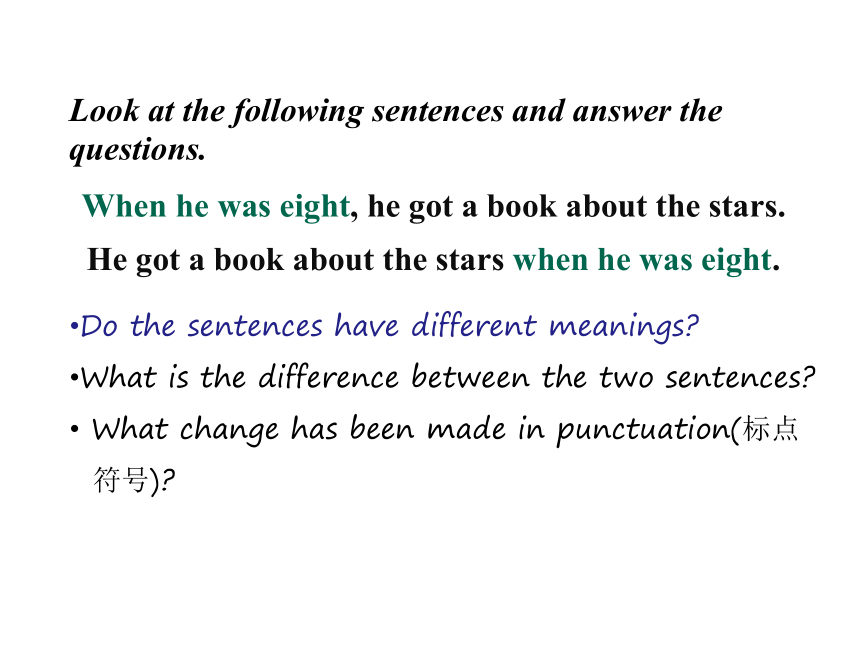
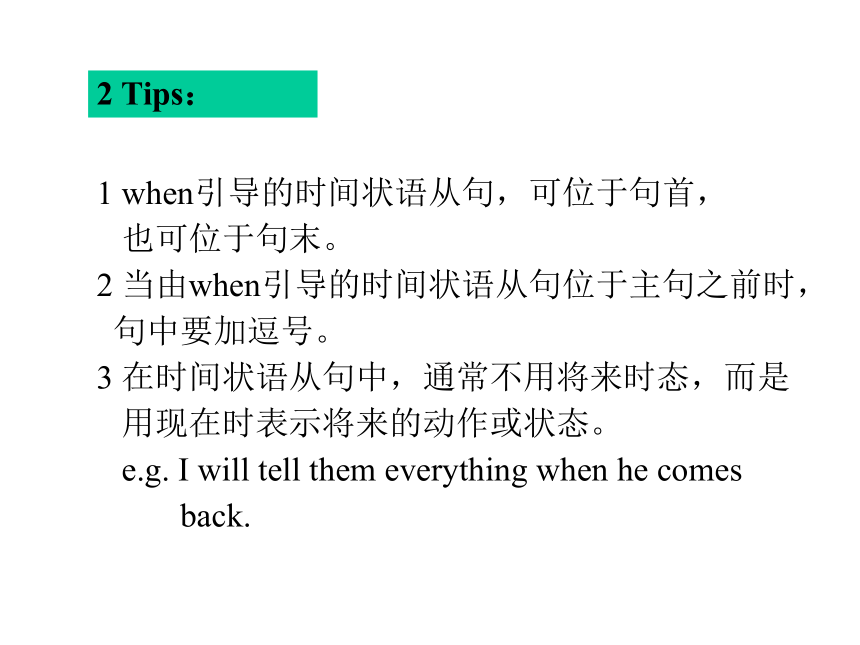
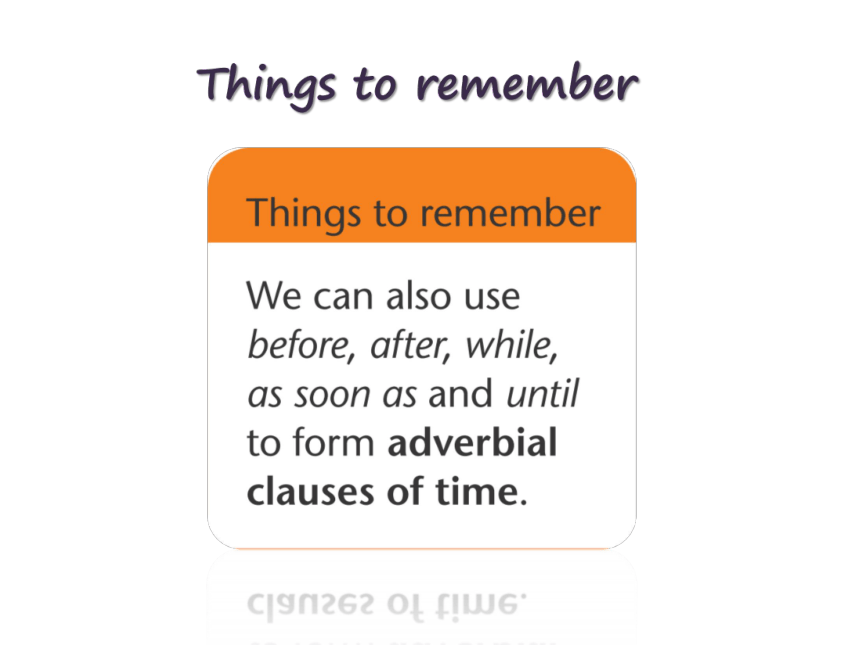

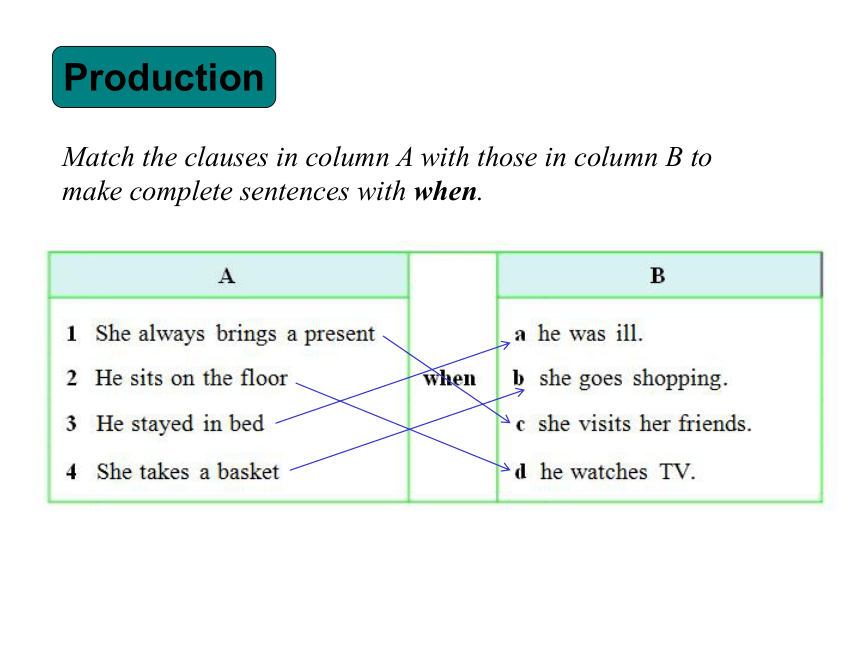
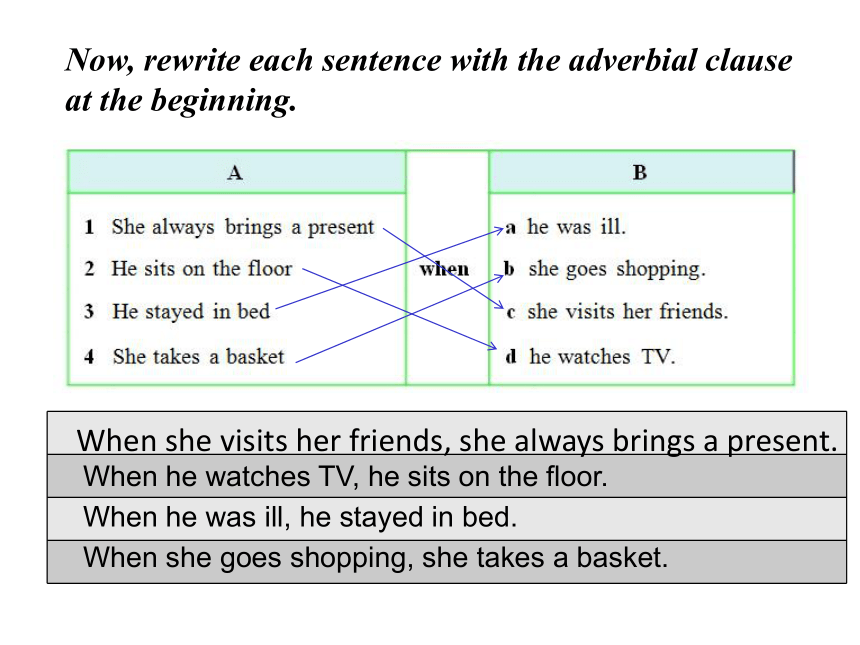
文档简介
七年级下册
Grammar
Unit 8 From hobby to areer
Presentation/Practice
1. We can use the conjunction when to form
an adverbial clauses of time. It links two
clauses into one sentence.
由when引导的时间状语从句用来表示某一时间发生的动作,从句的谓语动词通常用一般现在时或一般过去时。
A. Adverbial clauses of time (when)
时间状语从句
When did Patrick get a book about the stars?
When he was eight, he got a book about the stars.
何时
当……时
adverbial clauses of time
时间状语从句
main clause
主句
When he was eight, he got a book about the stars.
Look at the following sentences and answer the questions.
He got a book about the stars when he was eight.
Do the sentences have different meanings?
What is the difference between the two sentences?
What change has been made in punctuation(标点
符号)?
2 Tips:
1 when引导的时间状语从句,可位于句首,
也可位于句末。
2 当由when引导的时间状语从句位于主句之前时,
句中要加逗号。
3 在时间状语从句中,通常不用将来时态,而是
用现在时表示将来的动作或状态。
e.g. I will tell them everything when he comes
back.
Things to remember
Work out the rule
Work out the rule
Production
Match the clauses in column A with those in column B to make complete sentences with when.
Now, rewrite each sentence with the adverbial clause at the beginning.
When she visits her friends, she always brings a present.
When he watches TV, he sits on the floor.
When he was ill, he stayed in bed.
When she goes shopping, she takes a basket.
B.used to/did not use to
1. 表示过去经常性发生的动作(暗含现在已经不再发生)
肯定句 used to+动词原形
e.g. I used to go fishing at weekend.
否定句 did not/didn't use to+动词原形
e.g. I did not/didn't use to go fishing at the
weekend.
疑问句 Did +主语+use to+动词原形
e.g. Did you use to go fishing at the wekend?
2 Tips:
由于used to 表示不确定的过去,因此一般不与确定的过去时间连用。也不能与since 或 for 连用以表示动作或状态的延续。
Work out the rule
Work out the rule
Production
Mike used to go to bed at 9 p.m.
Now he goes to bed at 10 p.m.
Mike didn’t use to enjoy swimming.
Now he goes swimming every week.
Mike used to be shy.
Now he enjoys talking to people.
一、选择题。
1.---Do you know____ the Capital Museum?
---Next Friday.
A. when will they visit
B. when they will visit
C. when did they visit
D. when they visited
2.We won’t start the meeting ___ our teacher
arrive.
A. though B. until C. while D. or
3.Jane, please turn off the lights ___ you leave
the classroom.
A. after B. before C. until D. but
4.---Where was your brother at this time last
night?
---He was writing an e-mail ___ I was watching TV at home.
A. as soon as B. after C. until D. while
5.We have been good friends ___ we joined the
same ping-pong team.
A. after B. before C. since D. until
6.I was chatting with my friends on the
Internet in my study ___ my mother came
in.
A. while B. when C. as D. since
7.We’ll go shopping as soon as it ____.
A. will stop raining B. stops raining
C. will stop to rain D. stops to rain
8.---Excuse me, could you tell me ___ for
Taiwan?
---The day after tomorrow.
A. when did you leave
B. when you are leaving
C. when are you leaving
9.---Why do you bring your own meals to
school every day?
---Because of the earthquake, we can’t
have meals at school ___ the new
dining hall is completed.
A. until B. when C. if D. since
二 用 “ used to , did not use to 或 be used to” 填空。
He ________________ the weather in summer in Shenzhen.
There _______________ be a beautiful park.
I ________________ not ___________going out before eating supper.
You _______________ drink soft drink, but now you drink a lot.
My dad _____________ live in a big city but he _______________ living in a village now.
is used to
used to
am
used to
didn’t use to
used to
is used to
Homework
1. 复习并熟记该部分语法点。
2. 完成Grammar同步练习。
Grammar
Unit 8 From hobby to areer
Presentation/Practice
1. We can use the conjunction when to form
an adverbial clauses of time. It links two
clauses into one sentence.
由when引导的时间状语从句用来表示某一时间发生的动作,从句的谓语动词通常用一般现在时或一般过去时。
A. Adverbial clauses of time (when)
时间状语从句
When did Patrick get a book about the stars?
When he was eight, he got a book about the stars.
何时
当……时
adverbial clauses of time
时间状语从句
main clause
主句
When he was eight, he got a book about the stars.
Look at the following sentences and answer the questions.
He got a book about the stars when he was eight.
Do the sentences have different meanings?
What is the difference between the two sentences?
What change has been made in punctuation(标点
符号)?
2 Tips:
1 when引导的时间状语从句,可位于句首,
也可位于句末。
2 当由when引导的时间状语从句位于主句之前时,
句中要加逗号。
3 在时间状语从句中,通常不用将来时态,而是
用现在时表示将来的动作或状态。
e.g. I will tell them everything when he comes
back.
Things to remember
Work out the rule
Work out the rule
Production
Match the clauses in column A with those in column B to make complete sentences with when.
Now, rewrite each sentence with the adverbial clause at the beginning.
When she visits her friends, she always brings a present.
When he watches TV, he sits on the floor.
When he was ill, he stayed in bed.
When she goes shopping, she takes a basket.
B.used to/did not use to
1. 表示过去经常性发生的动作(暗含现在已经不再发生)
肯定句 used to+动词原形
e.g. I used to go fishing at weekend.
否定句 did not/didn't use to+动词原形
e.g. I did not/didn't use to go fishing at the
weekend.
疑问句 Did +主语+use to+动词原形
e.g. Did you use to go fishing at the wekend?
2 Tips:
由于used to 表示不确定的过去,因此一般不与确定的过去时间连用。也不能与since 或 for 连用以表示动作或状态的延续。
Work out the rule
Work out the rule
Production
Mike used to go to bed at 9 p.m.
Now he goes to bed at 10 p.m.
Mike didn’t use to enjoy swimming.
Now he goes swimming every week.
Mike used to be shy.
Now he enjoys talking to people.
一、选择题。
1.---Do you know____ the Capital Museum?
---Next Friday.
A. when will they visit
B. when they will visit
C. when did they visit
D. when they visited
2.We won’t start the meeting ___ our teacher
arrive.
A. though B. until C. while D. or
3.Jane, please turn off the lights ___ you leave
the classroom.
A. after B. before C. until D. but
4.---Where was your brother at this time last
night?
---He was writing an e-mail ___ I was watching TV at home.
A. as soon as B. after C. until D. while
5.We have been good friends ___ we joined the
same ping-pong team.
A. after B. before C. since D. until
6.I was chatting with my friends on the
Internet in my study ___ my mother came
in.
A. while B. when C. as D. since
7.We’ll go shopping as soon as it ____.
A. will stop raining B. stops raining
C. will stop to rain D. stops to rain
8.---Excuse me, could you tell me ___ for
Taiwan?
---The day after tomorrow.
A. when did you leave
B. when you are leaving
C. when are you leaving
9.---Why do you bring your own meals to
school every day?
---Because of the earthquake, we can’t
have meals at school ___ the new
dining hall is completed.
A. until B. when C. if D. since
二 用 “ used to , did not use to 或 be used to” 填空。
He ________________ the weather in summer in Shenzhen.
There _______________ be a beautiful park.
I ________________ not ___________going out before eating supper.
You _______________ drink soft drink, but now you drink a lot.
My dad _____________ live in a big city but he _______________ living in a village now.
is used to
used to
am
used to
didn’t use to
used to
is used to
Homework
1. 复习并熟记该部分语法点。
2. 完成Grammar同步练习。
